Politicians, Look to Your Own “Horrendous Impact” on Energy Prices
[This essay first appeared in the Providence Journal.]
As National Grid seeks a large increase in the rates that it charges for electricity, Rhode Islanders should keep a wary, well-informed eye on the statements of elected officials.
In the pages of the local Sakonnet Times, East Bay representatives John “Jay” Edwards and Dennis Canario, both Democrats, are presenting themselves on the side of the common Rhode Islander. Edwards says he understands the market reasons for the increase but that “this proposed increase is well beyond reasonable” and will be “a major impediment to growth.”
Canario is more dramatic: “There just doesn’t seem to be any concern on the part of National Grid as to what a horrendous impact this proposed rate increase will have on Rhode Islanders.” That’s a bold statement, and it makes all the more conspicuous something that Edwards doesn’t list as a reason for energy prices: the actions of legislators.
In 2004, the state government imposed a “renewable energy standard” that the RI Center for Freedom & Prosperity estimates will cost Rhode Islanders $21.4 million per year by 2020. Then, in 2009, the General Assembly passed legislation requiring energy distributors to enter into long-term contracts for “renewable” energy, even though it would explicitly increase energy costs.
If the renewable energy costs more than traditional sources of energy (which it will for the foreseeable future), the distribution company simply passes on the cost to all energy users as a separate “tariff.” In addition to the higher cost of “renewable energy,” the law allows the energy distribution company to tack on another 2.75% premium in profit, in order to create incentive to buy it from producers.
Representative Canario was not yet in the General Assembly, but Representative Edwards voted for that bill.
In the years that the RI Center for Freedom & Prosperity has tracked all legislation in the General Assembly for its Freedom Index, legislators have only piled on.
- An article in the 2012 budget shifted the use of various funds, such as the state’s cap-and-trade scheme, from ratepayer relief toward other priorities, including administrative expenses for government agencies. Edwards voted for that article. (Canario wasn’t elected, yet.)
- In 2013, the legislature raided the cap-and-trade funds again, allowing them to be used for other environmentalist projects. Both Canario and Edwards voted for that one.
- This year, the General Assembly empowered government agencies to commit Rhode Island to regional energy initiatives and increased the government’s involvement (i.e., red tape) with energy companies’ activities, including gas pipelines. Canario voted for the bill; Edwards was absent.
- Legislators also voted to create an elaborate “renewable energy growth program,” adding incentive payments and tariffs to the mix, shifting energy costs around among ratepayers. Canario voted for the final version of the bill, and Edwards (who was absent) had voted for an earlier version.
- The General Assembly also went after professionals who install renewable energy equipment (which will predictably make it more expensive), creating new “renewable energy professional” certificates required to do non-electrical and non-plumbing work. Both Canario and Edwards thought that was a good idea.
Government policies can have effects all at once or over long periods of time, often invisibly in the way they affect the market, and not all of these policies are fully in effect.
With the latest rate proposal, specifically, the increase comes mostly from the commodity price of the energy — which National Grid simply passes along to customers from its suppliers. Alone, the commodity price would actually have made for a 25.1% increase, and gross receipts taxes would have brought the increase up to 26.1%. An energy efficiency and renewable energy fee added another 0.24 percentage points to the total increase.
Other fees went down, however, chipping away at the increase to bring it down to 23.6%.
Even the surge in the commodity price is not the consequence of distant, untouchable forces, however. As regulations and activists cause energy producers to go out of business or halt their growth, it makes the price of what remains more volatile.
If the Brayton Point Power Station in Somerset follows through with its planned shut-down in 2017, for example, energy prices will go up. The region will also become more dependent on the flow of natural gas from elsewhere.
Yet, when Brayton made its announcement last year, Representative Edwards declared (again in the Sakonnet Times), “It’s a great day.” One wonders if Representative Canario has asked him why he didn’t express any concern about the “horrendous impact” on working families.
The East Bay representatives are not unique among their peers, and voters around the state should keep an eye on their own. It’s all well and good for politicians to make a public scene when government regulation and economic reality force businesses to increase their prices. The public (and the news media that serves it) should insist on a clearer picture and a more coherent, more realistic energy policy.



